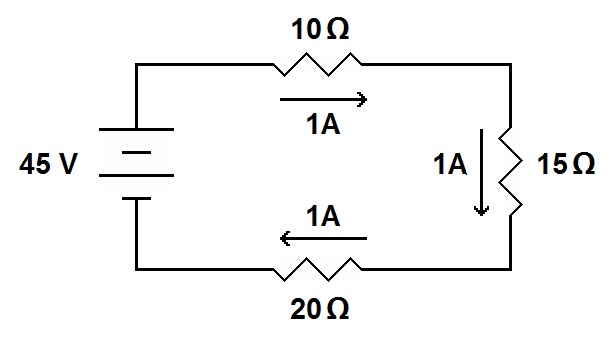| Vocademy |
Series Circuits
A series circuit is laid out such
that the components are connected end to end. This forms a single
circuit or loop from one side of the voltage source to the other. A
series circuit has only one path for current to follow.

Where:
In the preceding example, there is a total of 45 ohms in the circuit, the sum of 10 ohms, 15 ohms and 20 ohms.

| A series circuit |
Current
There is only one possible path for current to follow in a series circuit. The current in a series circuit flows equally through all components. In the example above the total current is 1 ampere. The 1 ampere flows through each of the resistors as it flows through the complete circuit. This is much like a horse race. If there are 10 horses in a race, those 10 horses will all travel completely around the track, taking each turn and straight in succession. No matter where an observer is around the track, he will see the same 10 horses go by as any other observer.Total Resistance
The total resistance in a series circuit is equal to the sum of the individual resistances in the circuit. This can also be expressed with the following formula:
RT = R1 + R2 + R3 (etc.)
Where:
RT is the total resistance of the series
circuit.
R1, R2 and R3 are each of the resistors in the circuit.
R1, R2 and R3 are each of the resistors in the circuit.
In the preceding example, there is a total of 45 ohms in the circuit, the sum of 10 ohms, 15 ohms and 20 ohms.
Why Don't Wires Have a Voltage Drop
| Vocademy |